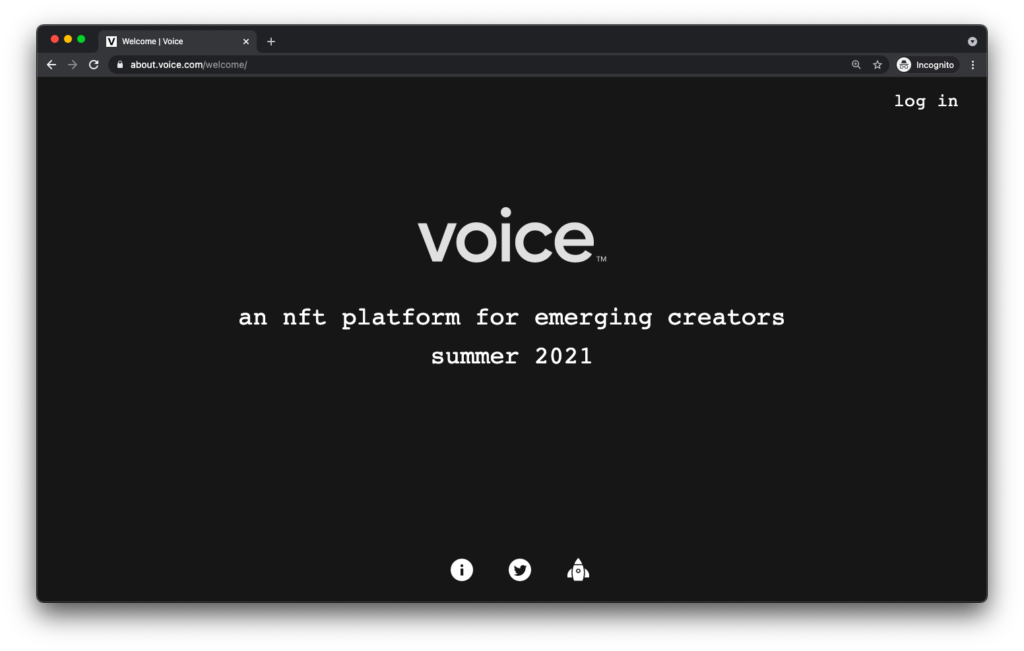Block.one sunk $150M into Voice — now it’s an unfinished NFT platform

Voice — the purportedly decentralized social media platform founded by Block.one — shut down in April less than one year after its launch.
Now, Voice’s landing page displays a message: “an NFT platform for emerging creators — summer 2021.”
On the surface, this appears to be a complete pivot, but Block.one would argue the move is simply an “upgrade.”

Voice chief exec Salah Zalatimo explained in a recent blog post that the company is looking to lean more on its “core strength” of tokenization.
We’ve heard Voice before
Last July, Zalatimo tweeted Block.one and Daniel Larimer’s then-new project Voice was open to registrants, complete with an attempted hashtag campaign: #TakeBackSocialMedia.
“Traditional social platforms aren’t working for society, so we’re building the alternative we all need.”
Block.one paid Michael Saylor’s MicroStrategy a groin-thumping $30 million for the Voice.com domain in the previous year.
Voice’s concept, it seems, was a decentralized social media platform.
Although, how Block.one would’ve accomplished that by relying on a private and centralized blockchain in EOS isn’t totally clear.
“It’s time for a more sustainable social media where everyone is aligned and gets their fair share,” said Zalatimo in a Medium article in April 2020, which called out Facebook’s Mark Zuckerberg directly in the headline.
Zalatimo noted news media is “critical to society,” and posited that the world needs a social media that pays publishers for content they produce.
Voice was supposed to be that change. In reality, the pitch was almost identical to the spiel Larimer parroted five years ago with one of his earlier projects, Steem (now abandoned).
Everything is an NFT now
Rewind to June 2019, at the B1 Keynote. An enormous screen flashes images of Wall Street and phrases like “rewriting the formula.”
Block.one chief exec Brendan Blumer and then-CTO Larimer are onstage, like awkwarder versions of Elon Musk presenting the cybertruck.
“Social media was intended for good, putting people in charge of what content they see and share,” Larimer began, hands clasped in front.
“But it’s become less about what you want to see and more about what big companies, anonymous bot operators, and internet trolls want you to see.”
Larimer looks into the camera. “We are here to change that, and guess what we are going to use to do that?” Yep, another token. The Voice Token.
There is delayed, stiff applause.
But enthusiasm for the platform — or Voice Token — never came. Now, Zalatimo says “instead of putting tokens next to creative content, the content itself will be the token.”
Voice’s NFT pivot inspired by Dorsey?
In reality, all this sounds very similar to the Cent Valuables platform recently utilized by Twitter boss Jack Dorsey.
Dorsey sold an NFT of his “genesis tweet” for $2.9 million in Ethereum earlier this year, and gave the proceeds to charity (after exchanging the ETH for Bitcoin).
But the distinction marking Voice’s NFT-powered platform from others is its supposed utilization of the EOS blockchain.

[Read more: Dorsey sold his first tweet for $2.9M in Ethereum, but charity gets Bitcoin]
Despite raising billions to fund its development, EOS is far from setting benchmarks for efficiency, fairness, or decentralization. Still, Block.one is making bold claims (literally, in bold) about Voice’s prospects.
The bottom of Zalatimo’s most recent announcement reads: “The days of creators being exploited by platforms are coming to an end.”
Is anything different?
Block.one and partner investors recently dumped a grundle-punching $10 billion into a new cryptocurrency exchange, which will also supposedly leverage EOS.
Voice could fit into that ecosystem, somehow, perhaps with direct exchange integration.
NFTs are hotter now than they were when EOS launched in 2018, though significantly waning in popularity. There’s also more institutional and retail investors in the space.
However, the most notable difference is that Larimer left EOS and Block.one at the start of the year to work on his own projects.
One of them is another decentralized social media platform (Larimer’s third). Indeed, Larimer — for once — is attempting to take on the likes of Facebook and Twitter without a blockchain.
[Read more: Palantir accepts Bitcoin as co-founder Thiel backs $10B crypto exchange]
Larimer calls the operating system for his new project Clarion. It uses “a friend-to-friend network to propagate messages” and will be “even more decentralized than email,” Larimer claims.
In some sense, this implies that Block.one’s Voice and Larimer’s Clarion will be competitors in the now-crowded niche of decentralized social media.
Who will come out on top? Probably neither.
